Some of the books we’ve read and can recommend. Each one has, in its own way, shaped our approach to value investing.
This shelf will continue to grow as we discover books that prove to be a catalyst for discussion and debate.
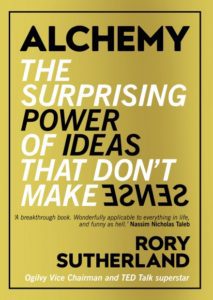
Alchemy, the Surprising Power of Ideas that don’t make sense by Rory Sutherland
Why is Red Bull so popular – even though everyone hates the taste? Why do countdown boards on platforms take away the pain of train delays? And why do we prefer stripy toothpaste?
We think we are rational creatures. Economics and business rely on the assumption that we make logical decisions based on evidence. But we aren’t, and we don’t.
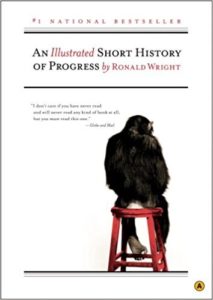
A short History of Progress by Ronald Wright
Discussing the pressing needs of our time by delving into the history of humanity, Ronald Wright explores how closely intertwined growth and progress are with environmental degradation. Rather than address the most pressing needs as they emerge, socieites in general (and elites in particular) have a tendency, historically, to maintain the status quo much to their detriment. Important historical lessons for humanity to keep in mind at this juncture of our existence.
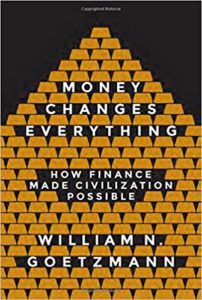
Money Changes Everything: How Finance Made Civilization Possible by William Goetzmann
Well-written, wide-ranging account of how integral finance was to the development of complex societies and cultures. The central thesis is that finance is a time machine, allowing individuals and societies to draw on the past (their savings) as well as tapping into the future (taking loans). Illustrated with vivid and entertaining examples, the author provides a fresh perspective on some of the most fundamental building blocks of our financial system and society.
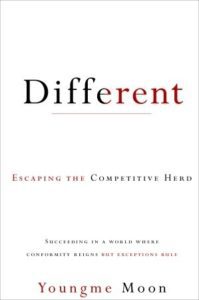
Different: Escaping the Competitive Herd by Youngme Moon
Original piece exploring the rationale as to why companies often focus on incrementally improving their products whereas it is truly original products that will revolutionise. The author argues that a good indication of a product on the cusp of a revolutionary step-change is the degree to which it has undergone multiple enhancements and added features. More than that, however, Youngme Moon argues that we should be aiming (as individuals and corporations) towards being meaningfully different, being different in such a way as to make a difference.
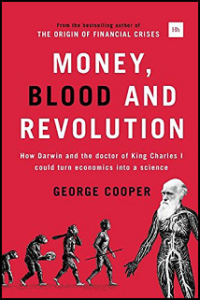
Money, Blood and Revolution by George Cooper
A quick read but stimulating and original. Cooper points out that economics currently feels like other sciences before they had their break-through moments: each had complicated systems that struggled to explain observed phenomenon and he observes that scientists will not drop an old belief system, no matter how obviously flawed, until another one is available to replace it. “Whether mainstream economists will take Mr Cooper’s ideas seriously is doubtful. But for those with an open mind his criticisms of the economics profession, and suggestions for new ways forward, will be extremely welcome” – Buttonwood column, The Economist.
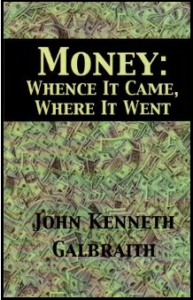
Money: Whence It Came, Where It Went – J.K. Galbraith
Galbraith takes us through a history of money and banking in the West from the 17th Century to the mid 1970’s. A Harvard economist, a former ambassador, and a leading Keynesian in the Roosevelt administration, John Kenneth Galbraith is at home in the twentieth century’s public life as few others are, and has a firm intellectual grasp of his sometimes slippery subject. Well written and even funny in his dry style, this is an informative history of money, banks and the folly of financial “experts”.
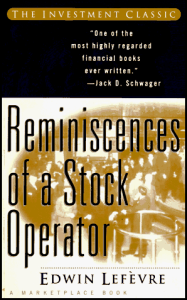
Reminiscences of a Stock Operator – Edwin Lefèvre
One can often learn from people who think very differently. Lefèvre’s protagonist, based on Jesse Livermore, the market trader and speculator of the 1920s, has a very different investing style from that of Kennox. This is an extravagant and detailed account of technical trading, market operation nuances, and trading psychology. It is revealing of its time and presents some very interesting investment nuggets.
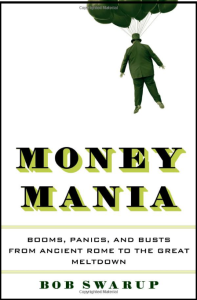
Money Mania – Bob Swarup
“You hold in your hand a history of financial speculation and its consequences. It tracks and analyses the persistent seduction of our senses by new investment opportunities… the never-ending, ever-enriching boom, fuelled by a surfeit of money; the complexities we never understand till it’s too late… the inevitable crash as investors scramble to realize their monies and salvage their egos; and finally, the brevity of financial memory that allows us to repeat the cycle endlessly without ever critically evaluating our own failings. In short, it is the story of what makes us human.” – Bob Swarup
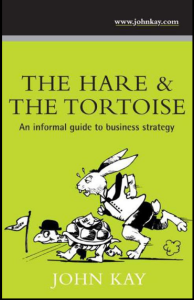
The Hare and the Tortoise – John Kay
A compilation of short, entertaining, stories based on articles written for the Financial Times prior to 2006. The collection contains a number of interesting insights for any reader with a general interest in business. The subjects Kay covers are just as relevant now as they were when first written.
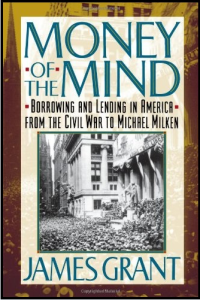
Money of the Mind: Borrowing and Lending in America from the Civil War to Michael Milken – James Grant
James Grant is one of the best writers of his generation on Wall Street today. Money of the Mind is a history of the companies and the individuals behind the evolution of the credit and lending markets in the US. Grant covers the last 100+ years of booms and busts (of which subprime is simply another example). For an anecdotal look at the world of debt, this book not only informs but also entertains.
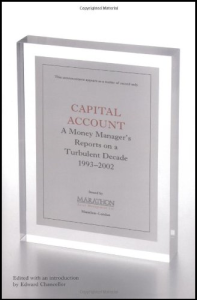
Capital Account: A Fund Manager Reports on a Turbulent Decade, 1993-2002: Reports from a Contrarian Fund Manager – by Marathon Asset Management
Capital Account relates the story of the world’s most recent great investment bubble from the perspective of professional investors. The book is comprised of selected reports from Marathon Asset Management, a successful global investment firm, and explains how shareholder value (the notion that companies should be run in the interests of their shareholders) became corrupted in the era of frenzied finance.
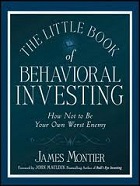
The Little Book of Behaviourial Investing – James Montier
An excellent reminder highlighting how our behavioural and psychological biases fool us into thinking we are making rational judgements when many times there are other motives involved. While standing in the tradition of Schiller, Montier offers practical advice on how to be more cognisant of our biases and simple ways to build habits in order to avoid highly negative consequences.
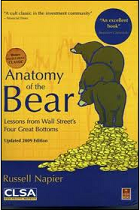
Anatomy of the Bear – Russell Napier
Russell sits on our Advisory Panel and there are few who can match his stimulating knowledge of economic history. His analysis of investment life at the bottom of the markets joins historical lessons to contemporary events – this is history written with an eye on today. More than good history, Russell`s insights have helped shape our views of the investment horizon.
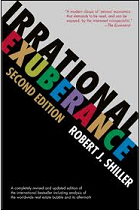
Irrational Exuberance – Robert Shiller
An essential read in behavioural economics. Not only did Shiller predict the economic crisis but he has become the de facto authority on the way behaviour effects markets. Moreover, his CAPE model has become a standard reference point for discussing valuation of stocks with many relying on his measures in order to gauge the health of the economy.
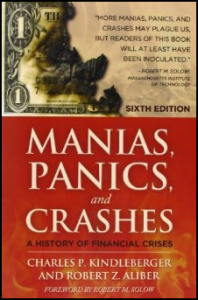
Manias, Panics, & Crashes – Charles P. Kindleberger
A modern classic and highly relevant for today. It is a topical study of bubbles and crashes and provides useful discussions relating to lender of last resort. The discussion of the lender of last resort suggests that it needs to exist but can’t be guaranteed. This raises interesting issues particularly as we find ourselves walking a fine line between moral hazard and recurring crises, with the only seeming solution to this dilemma is to rely on a lender of last resort.
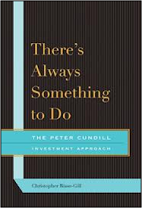
There’s Always Something to Do: the Peter Cundill Investment Approach – Christopher Risso-Gill
Peter Cundill was a personal friend to Kennox. We miss him and his valuable insights. Thankfully many of these have been preserved in an edited collection which summarizes his style and philosophy. An excellent place to start for would-be value investors from one of the industry’s most successful.
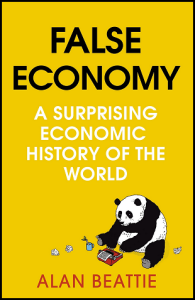
False Economy – Alan Beattie
A study into the surprising effect small variables have on economic outcomes. At its heart is a rallying cry for economic and political change on a global scale. Admirable as this, it is not surprising to find the prescriptions lacking concrete specificity. Recommended, though, for its analysis of historical economic change which, from our vantage point, appears as the inevitable outcome but which at the time was far from guaranteed. In this respect, his contrast of America with Argentina is highly illuminating.
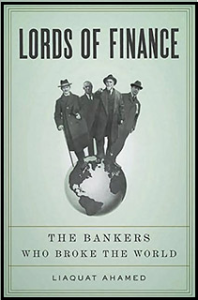
Lords of Finance – Liaquat Ahamed
An insightful account of the actions of central bankers from WWI to the Great depression. Particularly useful for context and viewpoints around a handful of major issues: war repatriations; returning to the gold standard; whether to hike rates in late 1920’s pre-1929 crash; Keynesianism; correlated bank crashes in 1931. Provides an interesting insight into current issues, and the difficult possibilities our advanced economies face.

Debt: The first 5000 years – David Graeber
An original and enlightening exploration of the development of money. The author offers a compelling alternative to the traditional narrative of the origins of money. His analysis extends to include fascinating aspects of money that are not normally part of standard discussions such as jubilees and write offs being an integral part of older, traditional economies and the moral dimension of debt. A lengthy read, but well worth the time spent.
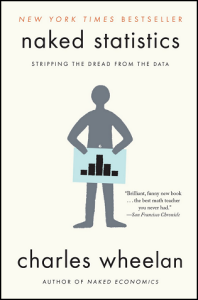
Naked Statistics – Charles Wheelan
A useful overview/review of statistics, their uses and how they affect our lives and the world we live in, including where they are powerful and where they are misleading. Discussions focus on Correlation, probability, central limit theory, inference, polling, and regression analysis.
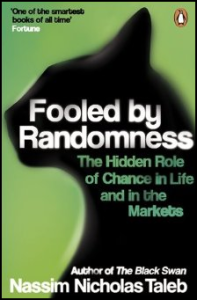
Fooled by Randomness – Nassim Nicholas Taleb
A revealing discussion of our propensity to explain things that should, in fact, be attributed to randomness. In other words, we see what happened – the end result – rather than all the things that could have happened given the organic nature of the process. The lessons when applied to the performance of traders and Fund managers are particularly illuminating and worth consideration
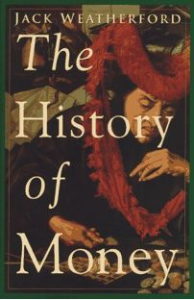
The History of Money – Jack Weatherford
An informative look at the development of money from the perspective of an anthropologist, highlighting that money had a significant effect on the development of society – from the way that humanity thought (such as an emphasis on maths) to the structures of societies and its political evolution. He emphasises three crucial stages in the development of money: (1) the emergence of money and coins, which was much more efficient than barter; (2) paper money, making it possible to multiple the money supply; and (3) electronic money which allowed even further multiplication of the supply.